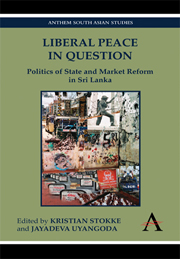Book contents
- Frontmatter
- Contents
- List of Illustrations
- List of Contributors
- 1 Liberal Peace in Question: The Sri Lankan Case
- 2 Travails of State Reform in the Context of Protracted Civil War in Sri Lanka
- 3 Fallacies of the Peace Ownership Approach: Exploring Norwegian Mediation in Sri Lanka
- 4 The Politics of Market Reform at a Time of Ethnic Conflict: Sri Lanka in the Jayewardene Years
- 5 From SIHRN to Post-War North and East: The Limits of the ‘Peace through Development’ Paradigm in Sri Lanka
- 6 Buying Peace? Politics of Reconstruction and the Peace Dividend Argument
- 7 Women's Initiative in Building Peace: The Case of Northern Sri Lanka
- 8 Liberal Peace and Public Opinion
- Notes
- References
2 - Travails of State Reform in the Context of Protracted Civil War in Sri Lanka
Published online by Cambridge University Press: 05 March 2012
- Frontmatter
- Contents
- List of Illustrations
- List of Contributors
- 1 Liberal Peace in Question: The Sri Lankan Case
- 2 Travails of State Reform in the Context of Protracted Civil War in Sri Lanka
- 3 Fallacies of the Peace Ownership Approach: Exploring Norwegian Mediation in Sri Lanka
- 4 The Politics of Market Reform at a Time of Ethnic Conflict: Sri Lanka in the Jayewardene Years
- 5 From SIHRN to Post-War North and East: The Limits of the ‘Peace through Development’ Paradigm in Sri Lanka
- 6 Buying Peace? Politics of Reconstruction and the Peace Dividend Argument
- 7 Women's Initiative in Building Peace: The Case of Northern Sri Lanka
- 8 Liberal Peace and Public Opinion
- Notes
- References
Summary
Introduction
Sixty years of Sri Lanka's existence as a post-colonial nation-state has seen a number of failed and incomplete state reform projects. Some of these attempts were made when the island nation in South Asia enjoyed the reputation of being a model of democracy with relative social peace. Others were made after Sri Lankan politics had taken a decisive turn towards civil war and violence. State reform in the Sri Lankan context has meant re-constitution of the state structure in order to create arrangements for power-sharing between the majority and minority ethnic communities through regional autonomy. The earliest reform attempts were in 1958 and 1966. On both occasions, leaders of the ruling Sinhalese political elite and the Tamil political elite agreed to implement limited arrangements for regional autonomy. Those were attempts made during Sri Lanka's ‘peace times,’ before the ethnic conflict developed itself into a civil war. Amidst opposition from Sinhalese nationalist constituencies, both attempts were abandoned. The others came up later, in the new context of a violent and protracted ethnic civil war – 1987, 1994–1995, 2000, 2002 and 2007–2008 being the crucial years in a continuing process of state reform failure. The details of these episodes are quite well-known and many of them are adequately documented in the literature on Sri Lanka's ethnic conflict (Coomaraswamy 1996, Loganathan 1996, Thiruchelvam 2000, Uyangoda 1999, 2007).
- Type
- Chapter
- Information
- Liberal Peace in QuestionPolitics of State and Market Reform in Sri Lanka, pp. 35 - 62Publisher: Anthem PressPrint publication year: 2011
- 4
- Cited by



